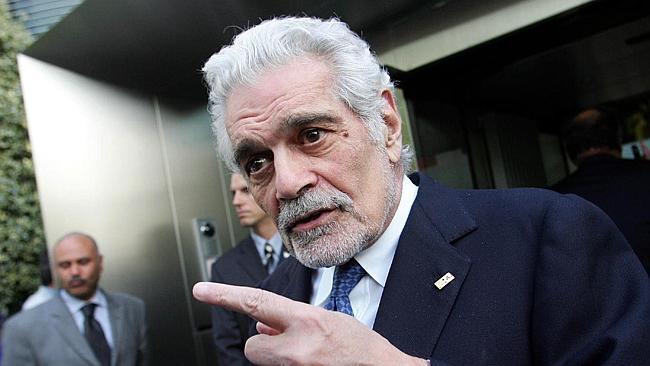Omar Sharif: Lawrence of Arabia made him a Hollywood star
Omar Sharif was unknown outside the Arab world when David Lean picked him for a key role in his epic.

Many would say Omar Sharif owed his international film career to David Lean. While preparing his epic Lawrence of Arabia, Lean was alerted to a handsome young actor little known outside Arab cinema and cast him as the chieftain Sherif Ali, who befriends Lawrence in the desert. Yet there was another figure who arguably played a more crucial role in Sharif’s success: his mother.
“She was determined that I would be the most handsome and most successful man in the world,” he said. “At 11, I was becoming incredibly fat, so she thought, ‘Where is the worst food in the world?’ and she sent me to an English boarding school. After a year I was skinny and I spoke perfect English — without which my career would never have taken off.”
Sharif’s engaging performance alongside Peter O’Toole in Lawrence of Arabia was widely noticed and earned him an Oscar nomination. He was suddenly in demand, playing everybody from Ingrid Bergman’s lover in The Yellow Rolls-Royce to the Mongolian war lord Genghis Khan.
Lean re-emerged in 1965 to offer Sharif the title role in Boris Pasternak’s Doctor Zhivago. The actor’s daily routine, as he played a physician caught up in the violence of the Russian Revolution, consisted of hair-straightening and skin-waxing to disguise his Middle Eastern heritage.
Despite being a big commercial success, the film failed to impress the critics, who were particularly underwhelmed by what they saw as Sharif’s dull and wooden performance. Even he agreed with them. “I found the part diabolically hard and I thought I was no good. I was on set every day with a tight elastic band around my head to make my eyes look less Arabic.”
Sharif nonetheless continued to be in demand for Hollywood and international films for another 20 years, winning three Golden Globes. His striking presence and dashing looks could not disguise his limitations as a performer, however, and for one French magazine his appearance in the 1969 film The Appointment confirmed him as “the worst actor in the entire history of the cinema”.
He was by no means that, though there were too many forgettable performances in undistinguished films. Interviewed on the set of Mayerling, in which he played troubled crown prince Rudolf of Austria, he said: “If a director wants Omar Sharif to play a part he gets Omar Sharif, not some nutty prince.”
Away from the screen Sharif became almost as well known as one of the world’s leading bridge players. He was a familiar figure at tournaments and wrote books and newspaper columns on the game. In his later years Sharif enjoyed explaining the fundamentals to his grandson, mischievously telling him that playing bridge was like making love: “You need a good partner or a good hand.”
Sharif was born Michel Demitri Chalhoub in 1932 in Alexandria into a family of Lebanese and Syrian descent. He was sent to Victoria College, an English-style boarding school in Alexandria, and earned a degree in mathematics and physics from Cairo University.
He made his first film, The Blazing Sun, in 1954, by which time he had changed his name to Omar El-Cherif. His co-star in The Blazing Sun was Faten Hamama, one of Egypt’s leading actresses, and they fell in love. He converted from Catholicism to Islam to marry her in 1955.
There followed a busy apprenticeship in Egyptian films, of which he made more than 20 in five years, and he also appeared in a couple of French co-productions. He seemed destined to remain a star of the Arab cinema until Lean discovered him for Lawrence of Arabia. The first time he set foot in Hollywood was for the film’s opening. “There was a party afterwards and people like Gregory Peck and Ava Gardner came to shake my hand. I was completely starstruck,” he recalled.
Of his films post-Lean, Funny Girl, in which he played the husband of Barbra Streisand’s showgirl Fanny Brice, was one of the better ones and reports of an affair between Sharif and his co-star caused a stir. It was not the first time, or the last, that Sharif was to be linked romantically to his leading ladies, who included Catherine Deneuve, Anouk Aimee and Sophia Loren.
If his love life, real or imagined, occupied many of the column inches devoted to him once his film career was no longer able to excite, much of the rest was devoted to his gambling habits. Sharif said he made so many bad films because he needed the money to pay off his debts. In 1991 he lost £750,000 at roulette in one evening; two years later, he claimed he was broke.
Between films Sharif made forays into television and the theatre. His marriage to Hamama produced a son, Tarek, but ended in 1974. Sharif did not remarry. For decades he chose to live in hotels rather than a home.
This year he was diagnosed with Alzheimer’s disease. A perennial gentleman, he accepted life with good grace, saying: “Given the circumstances, I’d probably do exactly the same things again.”
The Times


